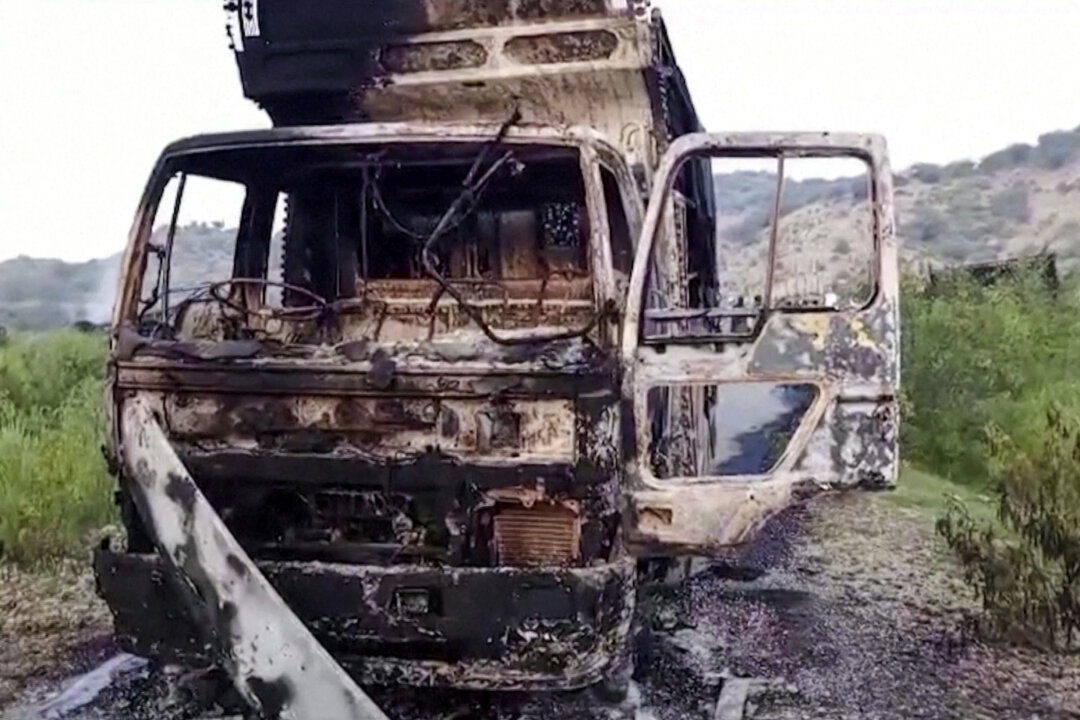The biggest assault by secessionists in years forms part of a decades-long campaign for Balochistan’s independence by separatist groups in the province.
Terrorist attacks on police stations, railway lines, and highways and the retaliatory strikes by security forces have killed more than 60 people in southwestern Pakistan, officials said on Aug. 26.
The biggest assault by secessionist terrorists in years forms part of a decades-long campaign by some in Balochistan to break away from the government in Islamabad.
The resource-rich southwestern province is home to major China-led projects including a strategic port and a gold and copper mine.
“These attacks are a well thought out plan to create anarchy in Pakistan,” Pakistani Interior Minister Mohsin Naqvi said in a statement, adding that security forces had killed 12 terrorists in operations after the attacks on Aug. 25 and 26.
Pakistan’s military said 14 soldiers and police officers, and 21 terrorists, were killed in fighting after the largest of the attacks, which targeted vehicles on a major highway.
It was not clear whether that figure included the 12 terrorists the interior ministry had already confirmed dead.
Local officials said 35 vehicles were set alight and at least 23 passengers were killed in the attack.
Trains in Quetta were suspended after there were blasts on a railway bridge linking the provincial capital to the rest of Pakistan, as well as on a rail link to neighboring Iran, railways official Muhammad Kashif said.
Police said they had found six unidentified bodies near the site of the railway bridge attack.
Terrorists also targeted police and security stations in Balochistan, killing at least 10 people in one attack.
Terrorist group the Baloch Liberation Army (BLA) claimed responsibility for the attacks in a statement.
The BLA is the largest of several Baloch ethnonationalist groups that have battled the central government for decades, saying it unfairly exploits Balochistan’s gas and mineral resources.
The group seeks the expulsion of China from the province and independence from Islamabad.
It is regarded as a terrorist group by Pakistan, the UK, and the United States.
Pakistani Prime Minister Shehbaz Sharif vowed that security forces would retaliate and bring those responsible to justice.
On the night of Aug. 25, armed men blocked a highway in Balochistan before forcing passengers from vehicles and then shooting them after checking their ID cards, Ayub Achakzai, senior superintendent of police, told Reuters.

“The armed men also not only killed passengers but also killed the drivers of trucks carrying coal,” Hameed Zahir, deputy commissioner of Musakhail, said.
Terrorists have targeted workers from the eastern province of Punjab whom they see as exploiting Balochistan’s resources.
In the past, they have also attacked Chinese interests and citizens in the province, where the Chinese Communist Party runs the strategic southern deepwater port of Gwadar and a gold and copper mine in its west.
The BLA said its fighters targeted military personnel traveling in civilian clothes, who were shot after being identified.
In contrast, Pakistan’s interior ministry says the dead were innocent citizens.
Six security personnel, three civilians, and one tribal elder were the 10 who died in clashes as armed terrorists stormed a station of the Balochistan Levies in the central district of Kalat, according to police official Dostain Khan Dashti.
Officials said police stations had also been attacked in two southern coastal towns, but the toll had yet to be confirmed.
Balochistan, which borders both Iran and Afghanistan, is Pakistan’s largest province by size, but it is the least populated and remains largely underdeveloped, with high levels of poverty.
In May, gunmen shot and killed seven barbers in Gwadar, a port city in Baluchistan, and in April, separatists killed nine people after abducting them from a bus on a highway in the province. The attackers also killed two people and wounded six in another car they had forced to stop.
The BLA claimed responsibility for both of those attacks.
Reuters and The Associated Press contributed to this report.

